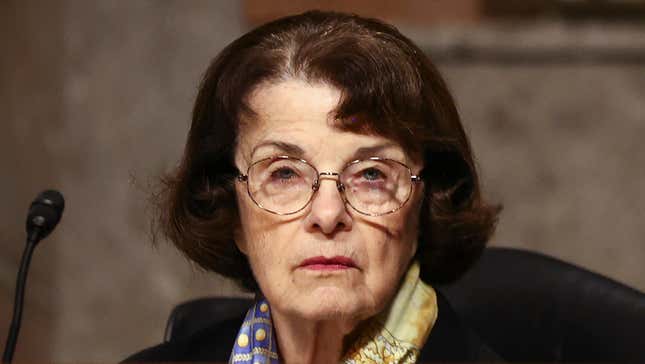Dianne Feinstein's Staff Suggests Her Age Is Becoming a Problem
Politics

At 87 years old, Senator Dianne Feinstein is the oldest member of the United States Senate. That wouldn’t be a problem if not for allegations from colleagues past and present that her age is catching up with her, raised in reporting by New Yorker writer Jane Mayer.
On Thursday, the New Yorker published a story documenting Feinstein’s apparent cognitive decline, reporting that the California Democrat suffers from short-term memory loss and has become increasingly frustrated by the demands of the job.
From the New Yorker:
… many others familiar with Feinstein’s situation describe her as seriously struggling, and say it has been evident for several years. Speaking on background, and with respect for her accomplished career, they say her short-term memory has grown so poor that she often forgets she has been briefed on a topic, accusing her staff of failing to do so just after they have. They describe Feinstein as forgetting what she has said and getting upset when she can’t keep up. One aide to another senator described what he called a “Kabuki” meeting in which Feinstein’s staff tried to steer her through a proposed piece of legislation that she protested was “just words” which “make no sense.” Feinstein’s staff has said that sometimes she seems herself, and other times unreachable.
The Feinstein who was long regarded as a perfectionist who “demanded to see every page going out of her office with her name on it” is, according to staffers, gone. Confusion, disorganization, and handwringing reign as aides and associates attempt a dangerous balancing act: Offer reverence to the senator while acknowledging that she is, perhaps, no longer fit to serve.
Feinstein seems to have some understanding of the need to step back. Following the confirmation hearing of Supreme Court Justice Amy Coney Barrett in November, Feinstein released a statement announcing that she will step down as a senior ranking member of the Senate Judiciary Committee. But the damage was already done. Feinstein’s performance during Barrett’s confirmation hearing in October was panned by progressive Democrats who argued that she unnecessarily coddled Barrett—an anti-abortion, ultra-conservative hardliner—and hugged her Republican Senate judiciary colleague Sen. Lindsay Graham, lauding his “fairness” during what she called “one of the best set of hearings that I’ve participated in.”
Given the fact that Barrett’s approval ratings went up after the confirmation hearing—which was shamelessly pushed through the Senate mere days before the 2020 election—it’s safe to say that Democrats were less charmed by the process.
Concern over Feinstein’s competency on the judiciary committee isn’t new. From the New Yorker (emphasis ours):
According to several sources, Chuck Schumer, the Democratic Minority Leader, was so worried that Feinstein would mismanage Barrett’s confirmation hearings that he installed a trusted former aide, Max Young, to “embed” in the Judiciary Committee to make sure the hearings didn’t go off the rails. He had done the same during Kavanaugh’s confirmation as well. Schumer brought Young in from the gun-control group Everytown to handle strategy and communications and serve as Schumer’s “eyes and ears” on Feinstein, as one Senate source put it.
This worry was underscored when an embarrassing Feinstein moment went viral in November. Twitter CEO Jack Dorsey was testifying before the Senate Judiciary, answering questions regarding Twitter’s ability and commitment to handling disinformation. When it was Feinstein’s turn to grill Dorsey, she did a good enough job, asking if Twitter does an efficient enough job alerting users when Trump tweets false claims. Just one problem: She repeated the same question to Dorsey again, verbatim, as if she never asked it in the first place.
Feinstein’s defenders are quick to say that concerns about the Senator’s cognitive decline are exaggerated. According to the New Yorker, some of her former aides are suggesting that the focus on Feinstein is sexist, and that there wasn’t nearly the same level of ire over “declining male senators” like Strom Thurmond or Robert Byrd. There’s no question that the increasing age of members of Congressional is a problem that goes beyond Feinstein. The average age of Senators rose to a high of 62.9 years in the 116th Congress.
But it’s 2020, and while sexism may drive some of the discourse around Feinstein’s age, she’s far from the only politician to be scrutinized because of their age. The 2020 presidential election cycle zeroed in on whether Sen. Bernie Sanders should run following his heart attack, and whether now President-elect Joe Biden had dementia. Even Trump, who drove much of the narrative regarding Biden’s cognitive decline—Sleepy Joe and all—was the subject of skepticism when he contracted covid-19, his age and health leading many to wonder if he’d even make it.
The Reagan era is over, the days of protecting politicians in decline is waning, and the time for Feinstein to retire was probably about two or three years ago. But Feinstein was re-elected during the 2018 midterms and she doesn’t seem to have any intention of stepping down any time soon.
Maybe Senate Democrats will be just fine with a slightly more confused, slightly more irate Feinstein in their midst. But perhaps it’s time for Democrats to do the one thing they often seem reluctant to do: Find new blood.